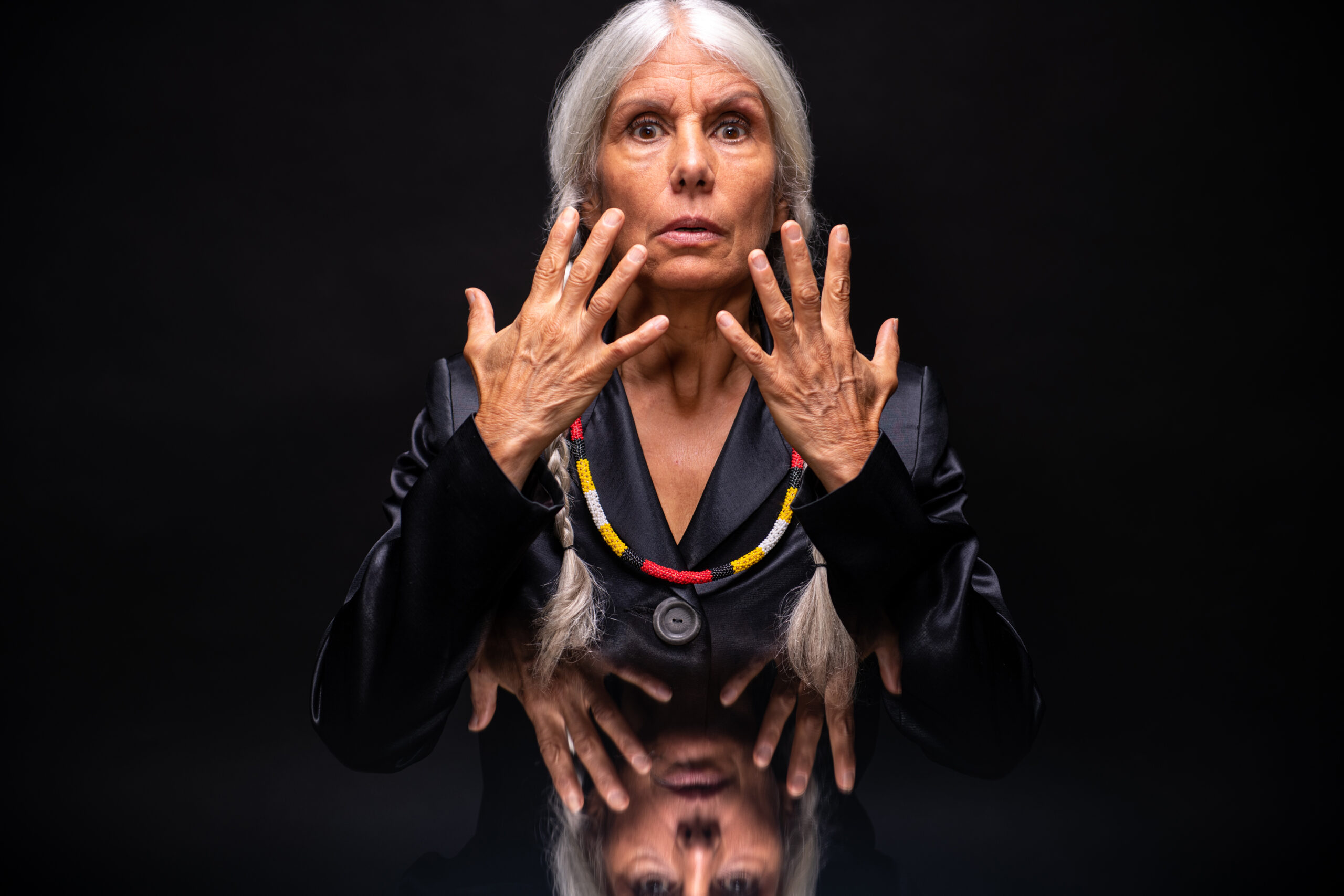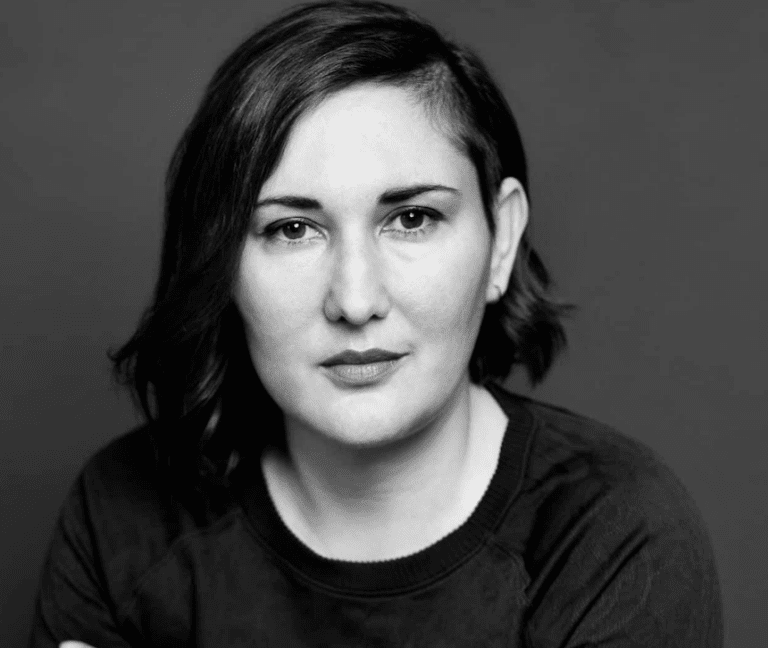Spotlight: Jani Lauzon
“She is the personification of that wise woman, that wild woman, that Elder, that clan mother with a matriarchal way of thinking that’s butting up against a patriarchal world.”
Though she could very well be speaking of herself, Jani Lauzon is describing her take on Paulina from A Winter’s Tale. As the summer winds down and she has just a few shows left as both Paulina and the Shepherd with Shakespeare in the Ruff’s production in Withrow Park, we find time between shows to talk about giving life to words, puppets, and masks.
“Bringing those characters to life, I have to look at them characters through my own life experience. I have to understand them through something that makes sense to me. Both the Shepherd and Paulina are equally part of a different aspect of who I feel I am.”

My first introduction to Jani was in the 1990s. A sullen, disenfranchised youth in Nova Scotia, I’d “ironically” watch Mr. Dressup, Big Comfy Couch and other children’s CanCon programming of the time. Truth was, I just enjoyed a good puppet; a hearty serving of The Muppet Show from a very young age nurtured that. Decades later, I would learn that Jani had worked not only as a puppeteer but a Muppeteer too! Unbeknownst to me at the time, Jani was part of an unseen team of artists fostering my love of the arts.
In 1991, while I was watching Jani bring puppets to life on TV, she was also bringing White Girl to life alongside Billy Merasty in the premiere production of Daniel David Moses’ critically acclaimed Almighty Voice and His Wife (Great Canadian Theatre Company).

Almighty Voice is both a love story and an investigation of First Nations and European relations, taking a conventional naturalistic approach to the chronology of Almighty Voice in the first act—only to toss convention aside with an almost vaudevillian exploration of the greater consequences of his murder through his life outside the physical realm in the second.
It all seems somehow fitting that, 28 years later, I’m sitting in Jani’s dining room, asking about her career, and her preparation for Almighty Voice rehearsals—only this time she has taken the helm as director for the production’s run in Soulpepper’s 2019 season.
Rough Seas, Tough Ships
It hasn’t always been smooth sailing in Jani’s career, and her journey from starring in the first production of Almighty Voice to directing it almost three decades later wasn’t a linear path. Had things gone differently with Soulpepper’s programming, another production entirely might have been in its place this season. And, had things gone differently in Jani’s early years as an artist, she might not have grown into the fierce matriarch of Indigenous theatre that she is.
When Jani’s daughter Tara was young, the Turtle Gals Performance Ensemble—a collective, which Jani had co-founded with Monique Mojica and Michelle St. John—was disbanding, and Jani was newly single; she was ready to give it all up, going so far as to send out resumes for non-arts-based jobs. Had the then newly-appointed artistic director of the National Arts Centre, Peter Hinton-Davis, not reached out, our story might have ended in the mid aughts.

“It was a case of the one door opening when others were closing,” Hinton-Davis writes to me in an email regarding the folding of Turtle Gals. “Jani exemplified the kind of artist I wanted to bring to a “national” resident acting company at the NAC. The impossible task of bringing together artists from a cross section of regions and communities, and building a repertoire with national scope, suddenly felt possible with Jani’s involvement. In this informed but, I admit, artistic leap of faith, I have found a life-long colleague. Love her.”
Jani of all Trades
What makes Jani’s work so compelling is also the thing that has made building her career a unique challenge. “I remember really really early on, as a young actor in Toronto. I had an opportunity to do a showcase (kind of like the Theatre Ontario showcases now) but, you know, for new grads and young emerging actors. A number of artistic directors would come and there would be this really big, frightening panel. I remember going in there and doing a classical monologue and then a clown piece. The response from the panel was that you need to pick one. I left thinking: okay, well, I can’t do that. It’s not who I am.”
“I think being a musician, singer-songwriter, and vocalist makes me a better actor. I understand rhythm in text. That’s why I love Shakespeare so much, because of the rhythm of the language. All of my acting work makes me a better singer, because I understand how to tell a story. All of my puppetry, mask, and mime work has made me a physical actor. So, I love physical comedy as a result of that. But I understand the strength of and power of stillness on the stage, which I also learned through doing that same mime, mask, and puppetry work. The command and knowledge I have of my body has been very helpful for me. I feel that all of these things help each other,” Jani reflects. “But one thing that it hasn’t allowed me to do is to excel in any one specific thing.”

It was the opportunity to work with NAC that pushed Jani as an artist. She had the opportunity to work with more rigorously trained actors and could bring her strengths in clowning and physical theatre to the fore. It was there that she also learned to command a large stage—an opportunity that can be difficult for Indigenous performers to receive.
It’s an uphill battle for any Indigenous artist hoping to have a mainstream career in theatre. There are Indigenous companies across the country doing great work, but they are often still relegated to smaller venues. The Centre for Indigenous Theatre is a Toronto-based school with annual showcases of some of the brightest up and comers. Native Earth Performing Arts is the oldest professional Indigenous theatre company in Canada; in 2018, they produced I Call Myself Princess, which Jani wrote. But the physical space of Native Earth’s Aki Studio is very different from that of the NAC. Being able to command space on a stage the size of that of NAC is a professional challenge and skill-development that smaller (but no less valuable) venues like Aki Studio and CIT cannot offer.
The opportunities for Indigenous artists to explore these larger spaces are increasing, however, because of the tireless work of gifted artists like Jani. Just this past September NAC Indigenous Theatre (the NAC’s official Indigenous arm) held the inaugural Moshkamo Indigenous Arts Festival, spearheaded by artistic director Kevin Loring.

From her work with Turtle Gals, to the NAC, to present day, Jani has been representing Métis and Indigenous identities, and telling stories from the margins with her unique voice. She’s been trailblazing her whole career—and continues to do so as a woman aging in a world that puts a premium on youth.
What does the future hold for Jani? Sadly, though she still enjoys clowning, she tells me that she has abandoned riding her unicycle; instead, she founded her own company, Paper Canoe Projects, in 2013. It’s a multidisciplinary company where Jani can focus on creation. And in true matriarchal form, Jani’s daughter Tara Sky—a recent graduate of the National Theatre School—has a hand in the company. Currently helping with grant writing in addition to developing her own work, Tara is also referenced in Jani’s recent solo show Prophecy Fog—co-produced by The Theatre Centre and Paper Canoe Projects in association with Nightswimming—and can be seen in the production’s video footage.
Mother Maker, Daughter Maker
“It wasn’t until my first year at NTS that I got this idea for a project that I wanted to start writing,” Tara tells me in a phone interview. “My mom was talking about companies and stuff. I got interested in grant writing, and in creating my own work, and what that would mean in the future. She was like, ‘Well I have a company right now and I actually need a little bit of help with grant writing. Do you wanna co-own this company? That way you are set up for the future when you do actually want to produce your own work.’”
The dynamic of an artistic mother/daughter relationship is an interesting one. There is so much knowledge and support Jani can offer Tara, but navigating their partnership seems fraught with complexities. “We’ve talked about it because it is bound to come up at some point,” Tara says. “We are going to work together in some form. I think if we work together on very equal grounds—where [we’d] always [have] someone else to mediate somehow; if we’re both actors in a show or we’re both writers and we have a dramaturg—then we’ll be able to work together. However, because she is also exploring directing right now, I don’t think I could be directed by my mom. I would definitely talk back a lot!”

For Jani, co-owning Paper Canoe Projects with Tara means more opportunities for growth in a number of ways. “I’m in a demographic as a woman where work opportunities are fewer, which had me creating my own work,” she says. “I realized that this would be a really good opportunity to support and nurture Tara at the same time, so that we could build opportunities for both of us—either together or separately.” But it’s not just about Jani nurturing Tara; there’s the potential for the tables to turn. “I wonder what it would be like her to direct me. I think that would be great.”
It isn’t easy to be an aging woman in the arts. But when I asked Marjorie Chan—artistic director of Theatre Passe Muraille, as well as dramaturge and director of I Call Myself Princess—to reflect on her time working with Jani, she offers a thoughtful perspective. “She’s always been a formidable voice and advocate, but I feel like times have shifted. That has allowed her voice to take up more space. In community and in general, [the shift has been happening] within the last 10-15 years. But it also speaks to her resilience, her strength; that her voice has been so consistent, so strong. Her wisdom is borne of her experience. Perhaps that is why she is being heard in this way right now.”
Wise, but Wild
Jani’s career has been hard won with, at times, seemingly insurmountable obstacles. But through her relentless dedication to the arts, commitment to her unique and powerful voice, and general resilience, it seems everything is coming into alignment for Jani to be recognized as one of the fiercest voices in Canadian theatre.

If her past is any indication of what is to come, Jani will continue to break new ground and shape the face of theatre in Canada. But for the time being, after years of wanting to revisit Almighty Voice and His Wife, she finally gets that chance. Things have a way of coming full circle.
Only now, Jani is steering the ship as that wise, wild, elder matriarch.










Comments